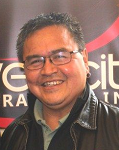Presenting to First Nations Peoples
In this article, I’m going to provide some practical tips on what to do and what not to do for speakers/presenters who will be making presentations...

 VANCOUVER - Thirty eight First Nations individuals will receive forestry-specific training and work experience through a $500,000 Labour Market Sector Solutions (LMSS) partnership between the B.C. government, the First Nations Forestry Council and industry partners.
VANCOUVER - Thirty eight First Nations individuals will receive forestry-specific training and work experience through a $500,000 Labour Market Sector Solutions (LMSS) partnership between the B.C. government, the First Nations Forestry Council and industry partners.
Funded through the Canada - British Columbia Labour Market Agreement (LMA), the First Nations' Forestry Training Project will prepare eligible First Nations individuals for skilled employment in the forestry industry. The program will be delivered through accredited training institutions in British Columbia including Nicola Valley Institute of Technology, Selkirk College, the College of New Caledonia and other public post-secondary organizations.
Participants will be directed into one of three program options, including:
In order to qualify for the program, participants must be either unemployed and not in receipt of Employment Insurance (EI), or employed but low-skilled. In addition, they must not have received or been eligible for EI in the last 36 months, they cannot already be a student, they must be living in British Columbia, and they cannot have received parental benefits within the last five years.
The British Columbia First Nations Forestry Council promotes First Nations business opportunities in forestry, collaborates with government on forest land use planning, tenure and revenue sharing and advocates on forestry matters on behalf of First Nations communities.
As a direct result of federal LMA funding, thousands of British Columbians are receiving training that will advance their careers, assist in securing new employment and ultimately improve the social and economic outcomes of individuals in B.C. and Canada. The LMA is one of the funding mechanisms to address B.C.'s labour and skills shortages.
Government is actively creating awareness and encouraging Aboriginal people to consider careers in the trades through programs like the Aboriginal Community-Based Delivery Partnerships Program and the Aboriginal Training for Employment Program. The programs are supported by the BC Jobs Plan and the BC Skills and Training Plan, which invests $75 million for new capital and equipment to complement $500 million in annual investments in skills and trades training programs.
Quotes:
Shirley Bond, Minister of Jobs, Tourism and Skills Training and Minister Responsible for Labour -
"The First Nations' Forestry Training Project will help participants gain valuable skills and the experience they need to work in the forestry sector. Programs like this one are critical to ensuring B.C. is equipped with the workforce necessary to fill up to one million job openings in the province by 2020."
Steve Thomson, Minister of Forests, Lands and Natural Resource Operations -
"This program builds on the commitment in our Forest Sector Strategy to increase the employment of First Nations in B.C.'s forest sector. The program also helps improve the understanding amongst First Nations, government and forestry licensees."
John Rustad, Minister of Aboriginal Relations and Reconciliation -
"We are committed to establishing partnerships that benefit First Nations communities - and that's exactly what the First Nations' Forestry Training Project does. I am confident this new partnership between government, First Nations groups, industry sponsors and training institutions will enhance business and economic development opportunities for participating communities."
Keith Atkinson, chief executive officer, First Nations Forestry Council (FNFC) -
"This training program has brought together many partners to seize an opportunity to incorporate skilled aboriginal people into the forest sector workforce, addressing today's oncoming labor shortages. By coming together, our program will deliver immediate results in the workforce, while providing the value-added benefits of long term relationships between forest companies and First Nations."
Chief Bill Williams, president, First Nations Forestry Council (FNFC) -
"This program is exactly what we need to take advantage of our significant youthful Aboriginal population, increasing demand in the forest sector work force, and the ongoing need for better relationships between First Nations, forest companies and government."
Archie MacDonald, general manager, Forestry, Council of Forest Industries (COFI) -
"We are very pleased to see this program come to fruition and look forward to the benefits it will deliver to First Nations, the forest industry and rural communities."
Quick Facts:
Training and work experience is vital in order for First Nations to develop meaningful careers. Employment, employment barriers and solutions are topics of interest in our free, weekly newsletter. Sign up now!

In this article, I’m going to provide some practical tips on what to do and what not to do for speakers/presenters who will be making presentations...

Keith Matthew, founder, Seklep Business Services, is a member of and former chief of the Simpcw First Nation. He served for five years as chief and...

In 2003, Corby Lamb, President, Capacity Forest Management Inc., left a senior management position with Western Forest Products Inc. to launch a...